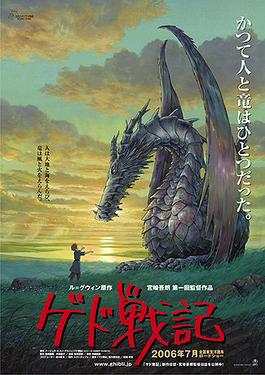
Few would argue against Miyazaki's film making genius. But does it run in the family? Studio Ghibli's latest offering is not by Miyazaki but in fact by his son. It's called Tales from Earthsea, and like Howl's Moving Castle, it's based on a book by some lady I've never heard of. Not that it matters. By the way, just a warning for anyone who, like me, was expecting a plurality of 'tales' throughout the movie: there is only one tale, the title is erroneous.
By their usual standards the movie was pretty average. You can be sure that, being Studio Ghbili, the artwork and visuals will be as amazing as you've come to expect. Quite frankly though the story is disjointed and its telling is overly dramatic, at times cringe-worthy. Yet the movie does get one thing very right: its philosophical message. After the dragons and sorcery of the first half of the film, the last thing I expected was to be confronted with philosophy in the second half. But sure enough, there were sections of dialogue that sounded hardly dissimilar to something by Albert Camus. I don't want to spoil it for those who have yet to see it, but the movie ultimately deals with the exact themes I discussed in my last post: death, fear of dying, eternal life, and ultimate meaning.
The message is not one of despair but one of hope. As humans, we are the only beings aware of our own mortality. Faced with this knowledge, we should neither by burdened by the immense weight of it all, nor should we take for granted the 'unbearable lightness of being' and in so doing dismiss its value. Whether the promise of eternal life comes from science or from religion (or, in the fictional world of the movie, from magic), it makes no difference: the promise is an empty one. A life without end would be like a song without its final chord, or a story without the last, poignant words of its closing chapter.
Death makes life poetic. Surely we might better embrace life by accepting death?




No comments:
Post a Comment